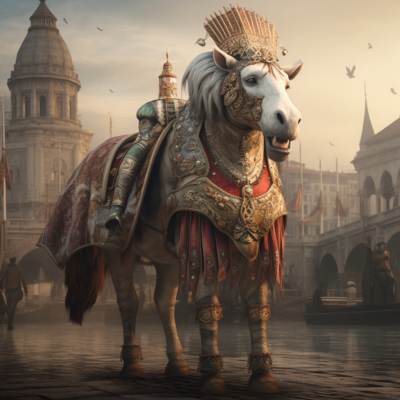News, Swords of the Serpentine
Playtesting: Intelligent Animals (Non-Human Heroes) in Swords of the Serpentine
 by Kevin Kulp
by Kevin Kulp
Now that we’ve explained the rules for non-human Heroes in Swords of the Serpentine, let’s start with the first Ancestry: Intelligent Animals. Please go read those base rules if you haven’t yet, as it will make this article make much more sense. Each month’s Ancestry will follow the same format, as shown below.
Intelligent Animals
Ancestry abilities: Ancestry (Animal Kingdom), Ridiculous Luck, Vigilance, Wilderness Mastery
- Ancestry (Animal Kingdom) encompasses your instinctive animal knowledge and skill for fitting into the wild kingdom, as well as any unique abilities linked to your choice of animal
- Ridiculous Luck reflects your natural advantages in a world run by humans instead of animals
- Vigilance represents your naturally keen eyesight, hearing, or sense of smell
- Wilderness Mastery reflects your ability to navigate, manipulate, and thrive in the wilderness
You’re an intelligent animal. You look like an animal and probably think of yourself as an animal as well – but you can speak human speech and you probably have some sort of opposable thumb or a prehensile limb that lets you manipulate objects almost as well as a human. You’re a normal animal size unless whatever made you intelligent also altered your height and mass. If you don’t have opposable thumbs because you have hooves, you can either go without, manipulate objects within arm’s reach with a form of minor telekinesis, or you have a loyal human around to pick up things for you, your choice.
Communicate with your GM; you’re responsible for picking an intelligent animal that’s fun and balanced to play, not the GM, and the GM can always veto your choice if it doesn’t fit the game they envision.
How’d you become intelligent? Some animals are the descendants of humans who were cursed into animal form; others sipped from a sorcerous pool they shouldn’t have, or are from faerie, or are created by mad alchemists or sorcerers, or were blessed by gods, or just have always been intelligent and speaking and anyone who thinks that’s odd is disappointingly ignorant. It’s up to you how this occurred, but let your GM know so that they can work it into a plot hook if they wish.
There’s a huge range in the size of intelligent animals, from a tiny swashbuckling mouse who sails the sea, up to a bear berserker who fills small rooms. As such, there is a great deal of difference in strength, carrying capacity, and maneuverability between intelligent animals. Small intelligent animals are stronger than normal, just so we make sure you can play a dashing cat with a rapier, but use common sense about such things. An intelligent mouse who uses Preparedness isn’t carrying lantern oil on them – but you can bet that they smell some nearby so long as they succeed at the Preparedness test.
Warfare attacks from an animal’s teeth and claws (or another natural attack, such as a horse’s kick) inflict a Damage Modifier of +0 for small animals like a frog, snake, or cat, +1 for medium-sized animals like a large dog up to a normal-sized horse, and +2 for large and strong animals like a bear or a lion. It’s up to you how your intelligent animal manages to inflict that much damage; perhaps you are particularly accurate, excrete natural venom, or have spent some time studying how to survive in a world controlled by humans.
Avoid playing animals who have trouble moving on land (such as a sloth or a fish) and who have difficulty breathing air. If you’re playing an animal that is normally amphibious, so are you; if you’re playing a bird you can fly (moving one range farther than normal in combat unless the GM says otherwise, but taking falling damage if you’re somehow picked off out of the sky), and if you’re playing a monkey or something similar you can brachiate. Common sense about trying to maneuver while carrying bulky objects applies; if you’re playing an intelligent raven and you’re hoping to wear armor, don’t expect to be soaring over the rooftops. The GM will strive to have you reach parity with human heroes, but your animal’s natural advantages and disadvantages will result in higher or lower Difficulty targets for some General ability tests, especially for Athletics and Stealth.
Intelligent animals use Sorcery and Sway normally. A small spellcasting animal who has invested ranks in Stealth can be delightfully effective against an unsuspecting enemy, although rumors about you from anyone who survives the fight will spread like wildfire.
Investigative ability: Ancestry (Animal Kingdom)
As an intelligent animal you likely don’t have a unique culture, but you’re part of a bigger web of life – the animal kingdom. You’re an authority on natural animals and their behavior. You have at least a passing knowledge of animal habits, behavior, hunting, and lore; you have deep knowledge about your own type of animals, your primary predators, and your primary prey. You know where to look for leads involving animals and hunting. Normal animals don’t speak like humans, but you can usually understand other animals and make yourself be understood.
Sample spend: Make another animal run from you if you are a predator or approach you if you are prey. Make another animal of your same (or similar) type like, trust, or accept you as one of their own. Inflict an additional die of damage when using your natural weapons to injure a foe. Gain a +5 bonus instead of the normal +3 to Athletics tests when you spend a point to increase your maneuverability.
Character Creation Advice
- The easiest sort of intelligent animals to play in a city environment are the ones who already fit in. Animals like swans, seabirds, dogs, cats, and rats are so common in Eversink that no one is going to think twice about seeing one nearby.
- Alternatively, a big showy animal is a great choice for when you want your Hero to have a reputation. People are absolutely going to remember the lumbering war-bear they nervously passed in an alley.
- Don’t feel you have to avoid Warfare just because you’re playing a smaller animal. Swooping in to target an enemy’s eyes can be just as much fun as demoralizing them or attacking them with sorcery.
- Pick abilities that match the sort of creature you want to play. Multiple ranks of Servility or Trustworthy make sense for an animal who blends into the background; multiple ranks of Intimidation make sense for an animal you want to be intrinsically terrifying.
- Stick with animals who fit the setting and the game’s tone. It’s harder for the other players to have a serious and exciting sword & sorcery adventure if you pick an animal that’s silly. As a good rule of thumb, avoid an animal you can’t picture in a classic fantasy novel or movie.
Sample Hero – Intelligent animal (bear)
Garoup the bear, ursine enforcer
Boisterous, imposing, insecure, curious, territorial
Drives (what is best in life?): Crushing a foe, establishing or defending your territory, eating fish
Defenses – Health: Health Threshold 4, Armor 2 (chain barding), Health 12
Defenses – Morale: Morale Threshold 3, Grit 1 (uncaring), Morale 6
Offense – Sway: Sway 5: Damage Modifier +1 (terrifying)
Offense – Warfare: Warfare 12: Damage Modifier +2 (claw and bite)
Investigative abilities: Charm 1, Intimidation 3, Taunt 1; Ancestry (Animal Kingdom) 1, Ridiculous Luck 1, Vigilance 1, Wilderness Mastery 3
Allegiances: Ally: Commoners 1, Ally: Outlanders 1; Enemy: Ancient Nobility 1
General abilities: Athletics 9 (Dodge), Stealth 4, Sway 5, Warfare 12 (Cleave)
Gear: Bloodstained gray fur, a spiked collar, custom-made barding (Armor 2), a terrifying roar you’ve been practicing in private because you’re worried it’s not quite scary enough, huge teeth and claws, a reprehensible disregard for human laws, not nearly enough fish.
Special: Moderately prehensile paws.
Sample Adversary – Intelligent Animal (raven)
Corvi, intelligent raven thief
Covetous, impatient, vindictive
Defense — Health: Health Threshold 4, Health 20
Defense — Morale: Morale Threshold 4, Grit 0 (easily startled), Morale 10
Offense — Warfare: +2; Damage Modifier +0
Offense — Sway: +1; Damage Modifier +1
Abilities: Malus 12; Burglary 10 (Fast Hands)
Special Abilities: Allies (cost 3 – Summon and command other birds), Flight, Lightning Speed (cost 3 – per round), Ridiculous Luck (cost 3 – 2 uses; functions as per the Investigative ability)
Misc: Alertness Modifier +1, Stealth Modifier +1.
Refresh Tokens: 5
Description: Corvi is a sarcastic talking raven. He is blessed by a small god of birds and has been trained by the god’s high priestess herself. He lives to steal, every theft a prayer; and he prefers to steal jewelry from the neck and ears of Eversink’s Mercanti and Ancient Nobility. He does all he can to avoid combat before or after a theft, using allied birds to confuse matters and darting away as quickly as possible.
Sample Allegiance
Intelligent animals tend to be the exception instead of the rule. Unless you’re in a magical land where all animals talk (similar to C.S. Lewis’s Narnia series), a talking animal is likely a rare and mysterious occurrence. Having Intelligent Animals as an available Allegiance implies that nature has organized against humanity and is likely no longer allowing people to enslave or tame animals. If you establish Intelligent Animals as an available faction, this is a major world-building choice that likely defines the setting.
Having intelligent animals as Allies means that you are considered a trustworthy ally of nature, someone who would go out of their way to aid the animals in their cause. In return, they will aid you with information they can spy out. You can gain insight into areas of deep wilderness and gain information that only animals might know.
Having intelligent animals as an Enemy means a constant series of small inconveniences and betrayals orchestrated by intelligent animals working against you behind the scenes. They may be unlikely to attack you directly but are certain to spy on you when possible. Others may consider you paranoid; only you know that that paranoia is absolutely justified.
—————-
Kevin Kulp (@kevinkulp) and Emily Dresner (@multiplexer) are the co-authors of Swords of the Serpentine, out now in hardback and PDF. Kevin previously helped create TimeWatch and Owl Hoot Trail for Pelgrane Press. When he’s not writing games he’s either smoking BBQ or helping 24-hour companies with shiftwork, sleep, and alertness.


